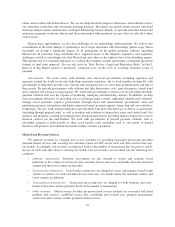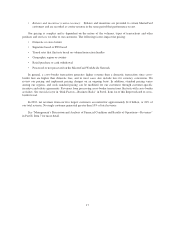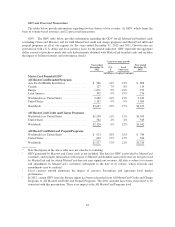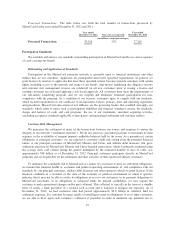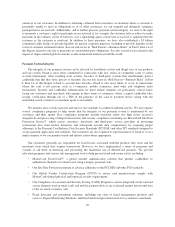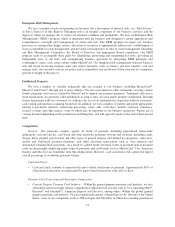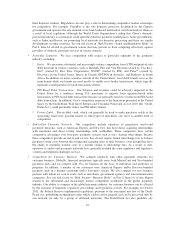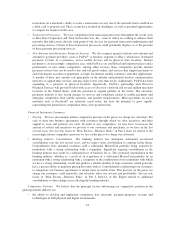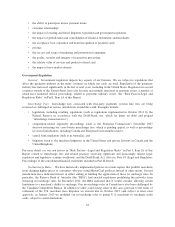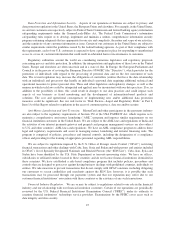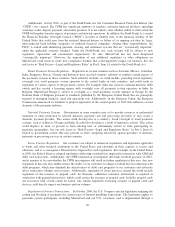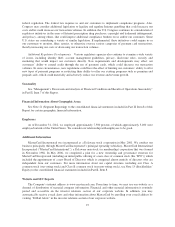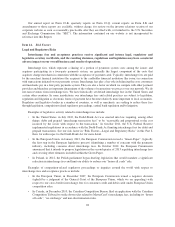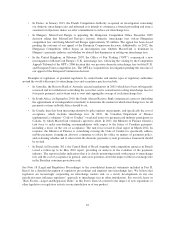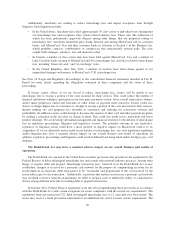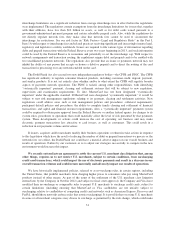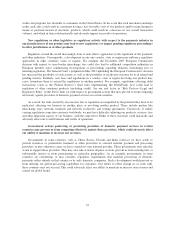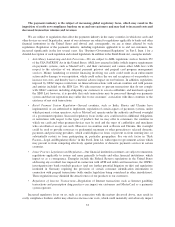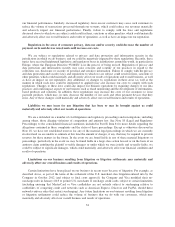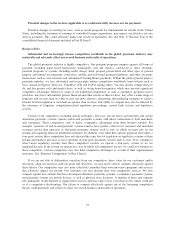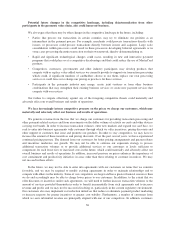MasterCard 2012 Annual Report Download - page 30
Download and view the complete annual report
Please find page 30 of the 2012 MasterCard annual report below. You can navigate through the pages in the report by either clicking on the pages listed below, or by using the keyword search tool below to find specific information within the annual report.Additionally, in July 2010, as part of the Dodd-Frank Act, the Consumer Financial Protection Bureau (the
“CFPB”) was created. The CFPB has significant authority to regulate consumer financial products, including
consumer credit, deposit, payment, and similar products. It is not entirely clear whether and/or to what extent the
CFPB will regulate broader aspects of payment card network operations. In addition, the Dodd-Frank Act created
the Financial Stability Oversight Council (“FSOC”) in order to identify risks to the financial stability of the
United States that could arise from the material financial distress or failure of, or ongoing activities by, large,
interconnected bank holding companies or nonbank financial companies. Among other responsibilities, the
FSOC is tasked with identifying payment, clearing and settlement systems that are “systemically important”
under the applicable statutory standard. Under the Dodd-Frank Act, such systems will be subject to new
regulation, supervision and examination requirements. To date, MasterCard has not been designated
“systemically important.” However, the imposition of any additional regulatory or other obligations on
MasterCard could result in costly new compliance burdens that could negatively impact our business. See our
risk factor in “Risk Factors—Legal and Regulatory Risks” in Part I, Item 1A related to the Dodd-Frank Act.
Retail Payments System Regulation. Regulators in several countries such as Australia, Mexico, Colombia,
India, Singapore, Russia, Ukraine and Indonesia have received statutory authority to regulate certain aspects of
the payments systems in these countries. Such authority includes, or could include, providing broad regulatory
oversight over retail payments system operators to the central banks in such countries, and could result in
regulation of various aspects of the payments system. For example, India has created a national domestic debit
switch and has created a licensing regime with oversight over all payments system operators in India. In
Belgium, MasterCard Europe is subject to oversight as a retail payments system operator in Europe by the
National Bank of Belgium pursuant to standards published by the European Central Bank that are principally
targeted at managing financial, legal and operations risk. Additionally, in the European Union, the European
Commission announced its intention to propose legislation in the second quarter of 2013 that addresses several
elements of the payments industry.
National Payments Systems. Governments in some countries may act to provide resources or preferential
treatment or other protection to selected domestic payment card and processing providers or may create a
domestic payment provider. This action could develop due to a country’s broad oversight of retail payments
systems, such as in Russia, Ukraine and India. It could also develop as a result of legislative activity. This action
could displace us from, or prevent us from entering into, or substantially restrict us from participating in,
particular geographies. See our risk factor in “Risk Factors—Legal and Regulatory Risks” in Part I, Item 1A
related to government actions that may prevent us from competing effectively against providers of domestic
payments or processing services in certain countries.
Issuer Practice Regulation. Our customers are subject to numerous regulations and legislation applicable
to banks and other financial institutions in the United States and elsewhere in their capacity as issuers and
otherwise, and as a consequence MasterCard is impacted by such regulations. For example, in the United States
in 2009, the Federal Reserve adopted regulations addressing overdraft fees imposed in connection with ATM and
debit card transactions. Additionally, the CFPB launched an investigation into bank overdraft practices in 2012,
and it remains to be seen whether the CFPB investigation will result in further regulation in this area. Any new
regulation in this area may further restrict the ability of our customers to charge overdraft fees in connection with
debit programs, which may diminish the attractiveness of debit card programs to our customers and adversely
affect transaction volumes and revenues. Additionally, regulation of issuer practices around the world include
regulation of the issuance of prepaid cards. In Germany, additional consumer information is required in
connection with prepaid transactions, which could restrict the issuance of prepaid cards. In India, prepaid cards
not associated with a bank cannot be issued. Any similar regulation restricting issuance of prepaid cards and
devices could directly impact our business and our volumes.
Regulation of Internet Transactions. In October 2006, the U.S. Congress enacted legislation requiring the
coding and blocking of payments for certain types of Internet gambling transactions. The legislation applies to
payments system participants, including MasterCard and our U.S. customers, and is implemented through a
26


